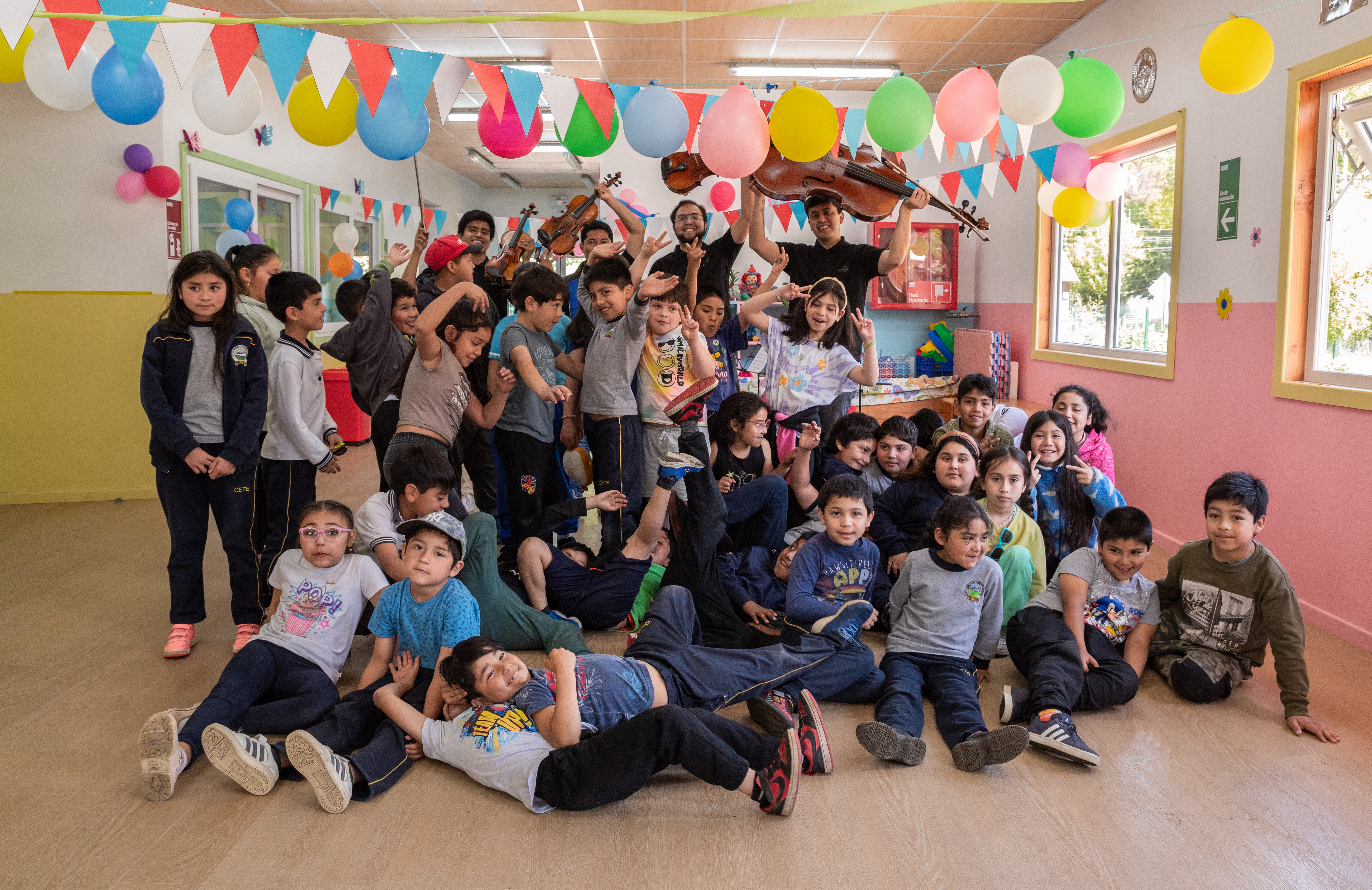
Patagonia’s Huilo Huilo Festival Blends Musical Excellence with Social Impact

Schoolchildren and festival musicians celebrating. Photo: Huilo Huilo Festival.
In the heart of Chilean Patagonia, the strings of a violin resonate deep within the temperate forest. Birds sing in harmony with the refined sounds of bows gliding over the strings; leaves whisper centuries-old stories. The Huilo Huilo Biological Reserve, where endangered species are protected, also embraces a group of young musicians—along with their mentors, who are string principals in the Brussels Philharmonic—during daily rehearsals and performances. It’s an inspiring fusion of human artistry and Patagonian majesty.
The Huilo Huilo Music Festival was founded in 2017 by Chilean percussionist and cultural entrepreneur Raúl Vergara and Otto Derolez, concertmaster of the Brussels Philharmonic. They were driven by the belief that music can be a powerful tool for transformation, even in the most remote regions. Held annually in this nature reserve in Panguipulli, in Chile’s Los Ríos region, the festival offers an intensive residency for up to 28 young musicians, ages 18 to 30, from around the world. Participants are selected through a competitive process that includes video auditions, resumés, and motivational letters. Under the artistic direction of Derolez and the management of Vergara, the festival has grown into one of the most impactful initiatives of its kind in South America.
The festival’s educational vision is built upon four pillars: individual development, fostering each musician’s technical and artistic growth; teamwork, encouraging collaborative and meaningful connections among participants; connection with nature, immersing the experience within Patagonia’s unique landscape; and professional development, preparing young artists for the demands and opportunities of the global music scene. During the residency, musicians receive one-to-one lessons, engage in chamber music rehearsals, participate in interdisciplinary activities—such as meditation, luthier classes, and guided hikes—and perform in public concerts.

What truly sets the festival apart, however, is our “Music in the Schools” initiative. Throughout the week, festival musicians engage in a dozen interactive educational concerts for children in remote schools, with limited infrastructure, across the Los Ríos and Araucanía regions. These performances include both classical and folk works and are adapted to ensure that children can engage directly—by playing instruments, singing along, or simply feeling included in the musical experience. Along with the festival musicians come luthiers who fix local instruments and give lessons in instrument repair.
These local encounters, which often conclude with side-by-side concerts, are filled with emotion and discovery. Children’s eyes sparkle as they hold a violin for the first time or listen to a live string quartet. These are more than musical performances; they are bridges to new perspectives. Music becomes a powerful tool of empowerment.

The festival itself concludes with a grand finale concert at the Teatro Educativo de las Artes in Panguipulli, where festival participants perform the repertoire they’ve worked on together. The audience often includes some of the schoolchildren and their family members. This concert represents the peak of a journey defined by artistic growth, collaboration, and connection. The fellows return home from the festival with stronger technical skills, but also with a deepened sense of purpose and civic responsibility. Our unspoken motto becomes clear: We grow when we give others the same opportunities we have received.
Over the course of its eight years, the festival has faced a number of challenges that have shaped our growth and deepened our mission. Operating in a remote area of Patagonia presents complex logistical demands, from transporting equipment and fragile stringed instruments through rugged terrain to ensuring stable communications infrastructure. The global nature of the festival adds further complexity: artists and fellows come from diverse cultural and musical backgrounds, so fostering collaboration requires thoughtful coordination.
In the years ahead, we plan to expand from a string-based to a symphonic festival. We are also exploring ways to expand our community-based initiatives—encouraging the active participation of local communities and nurturing a sense of belonging through the shared musical experience developed throughout the festival. Naturally, these dreams come with new challenges, such as strengthening lasting partnerships with local collaborators and ensuring that the activities are truly accessible and meaningful to all audiences involved.
But we believe that it is precisely in this close relationship with community that the festival’s long-term strength and sustainability reside. Our aim is not only to inspire through one-time experiences but also to help cultivate lasting musical ecosystems in underserved communities.

The festival is made possible through support from the government of Chile (through the Ministerio de las Culturas, las Artes y el Patrimonio), Fundación Huilo Huilo, the Brussels Philharmonic Orchestra, and the Belgian government. In addition to its unique training model, the Huilo Huilo Music Festival also provides participants with professional opportunities ranging from concert performance, instrument accessories, and even artistic residencies abroad. Every year, the participant who wins the “Jóvenes Solistas” competition is awarded a residency in Brazil with Santa Marcelina Cultura, and every other year, a participant is invited to join the Brussels Philharmonic for a one-year contract. These experiences, combined with the immersive artistic environment, are catalysts for the growth and success of the young musicians.
For those inspired by Huilo Huilo’s model, here are key insights to consider when blending music education with immersive natural settings. First, the environment should not be treated merely as a scenic backdrop, but as a co-educator—shaping the pace, mood, and values of the learning experience. Second, building strong local alliances and listening deeply to community needs are essential for authentic and respectful engagement. And above all, programs should be designed with flexibility and heart: when young artists and communities are invited into a shared creative process, the result can be both artistically extraordinary and socially meaningful.

